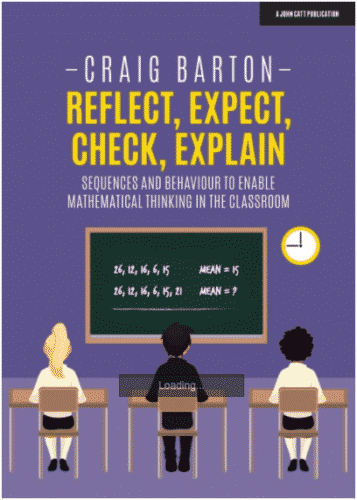In this interview with Craig Barton, author of Reflect, Expect, Check, Explain: Sequences and behavior to enable mathematical thinking in the classroom (John Catt Educational), find out about his interpretation of the variation theory. It’s an idea of mathematics that holds essential parts of concepts, ideas, and examples constant while changing only specific parts. Then, in the classroom, the teacher draws student attention to those changes, impacting the outcome.
A few years ago, Barton began reading all he could on variation theory, and started to write sequences of questions, launched a website, and started talking about the concept. Much to his fascination, he experienced an initial backlash as some teachers found his theories “too reliant on common sense” and unhappy with some of his interpretations. Instead of trying to convince educators that he was right, Barton concentrated on the clarity of the message and concept that eventually led to his recent book.
In this interview, Barton examines the motivation behind math learning and the surprising realization that teaching kids in a way that makes them feel successful can be the most motivating of all. While listening to the interview, think of teaching methods that you have found useful and then consider the following questions:
• What do you think of the variety of motivation tactics used in the classroom? Is there an over-emphasis on the knowledgeable and “highly able” students that naturally thrive in mathematics?
• Are engaging activities as effective as they can be? Do you notice certain teaching methods that make students feel successful and thus drive learning outside their comfort zones?
• Are you instituting key student practicing or routines, in a way that enables them to think mathematically while building competency and fluency, without becoming dull and uninspiring? Instead of unrelated mathematical questions, are there practice methods used that string together a sequence of questions for a broader relational concept?
• How can we draw out the beauty of relationships inside mathematics so that every child has the opportunity to appreciate them? How can teachers help the mathematically reluctant become more inspired?
Learn more about Craig Barton’s book, Reflect, Expect, Check, Explain, and more great John Catt Educational publications, by visiting us.johncattbookshop.com
About Craig Barton

Craig Barton has been a maths teacher since 2004, working at Range High School in Formby, and Thornleigh Salesian College in Bolton, UK. Four years into his career he was appointed as an Advanced Skills Teacher (AST). The appointment enabled him to focus all his attention into teaching and learning, having the privilege to work with and learn from many students and teachers in a wide variety of schools.
He is the co-creator of Diagnostic Questions, a free website hosting the world’s largest collection of high-quality maths diagnostic multiple-choice questions, that helps teachers and students all around the world identify, understand and resolve key misconceptions.
Barton is the Head of Education at Eedi, a company he co-founded that now owns Diagnostic Questions. He is very excited about future plans for improving teaching and learning worldwide.
Since 2009 he has been the Secondary Maths Adviser to TES (formerly the Times Educational Supplement), the largest professional network of teachers in the world. The role involves curating and reviewing some of the amazing resources written by generous and talented maths teachers all over the world, as well as writing newsletters, and building collections.
Since building mrbartonmaths.com in 2007, his website has been used by millions of teachers, students and parents across the world. In 2016 it was given a make-over, introducing my Topics and Rich Task sections.
He is the creator of the websites variationtheory.com, ssddproblems.com, and mathsvenns.com.
He launched Mr. Barton Maths Podcast in 2015, allowing him to talk to people from the world of education, including Dylan Wiliam, Doug Lemov, Daisy Christodoulou and Dan Meyer.
His book, How I wish I’d taught maths: Lessons learned from research, conversations with experts and 12 years of mistakes came out in January 2018. It is published by John Catt Educational. In February 2020 his second book, Reflect, Expect, Check, Explain: sequences and behaviour to enable mathematical thinking in the classroom was published.
Follow Craig on Twitter @mrbartonmaths
- TES News – Boys overestimate their maths ability more than girls
- The Guardian – Did you solve it? The enduring appeal of Venn diagrams
- edCircuit –Driving Change from the Bottom-Up





